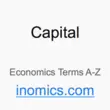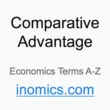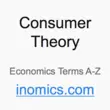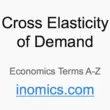-
- Economics Terms A-Z
- Posted 6 years ago
Capital
en it es de fr
-
- Economics Terms A-Z
- Posted 6 years ago
Capital Markets
en it es de fr
-
- Economics Terms A-Z
- Posted 6 years ago
Ceteris Paribus
en it es de fr
-
- Economics Terms A-Z
- Posted 1 year ago
Characteristics of Money

-
- Economics Terms A-Z
- Posted 2 years ago
Club Goods
en de fr
-
- Economics Terms A-Z
- Posted 5 years ago
Cobb-Douglas Production Function
en it es de fr
-
- Economics Terms A-Z
- Posted 2 years ago
Common Resources
en de fr
-
- Economics Terms A-Z
- Posted 6 years ago
Comparative Advantage
en it es de fr
-
- Economics Terms A-Z
- Posted 3 years ago
Consumer Price Index
en it es de
-
- Economics Terms A-Z
- Posted 6 years ago
Consumer Surplus and Producer Surplus
en it es de fr
-
- Economics Terms A-Z
- Posted 6 years ago
Consumer Theory
en it es de fr
-
- Economics Terms A-Z
- Posted 3 years ago
Cournot Competition
en es de
-
- Economics Terms A-Z
- Posted 2 years ago
Creative Destruction

-
- Economics Terms A-Z
- Posted 6 years ago
Cross Elasticity of Demand
en it es de fr
-
- Economics Terms A-Z
- Posted 1 year ago
Crowding Out
en de fr


















